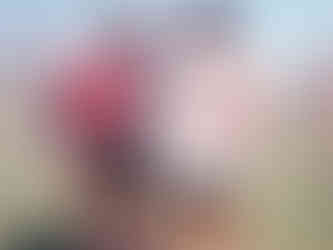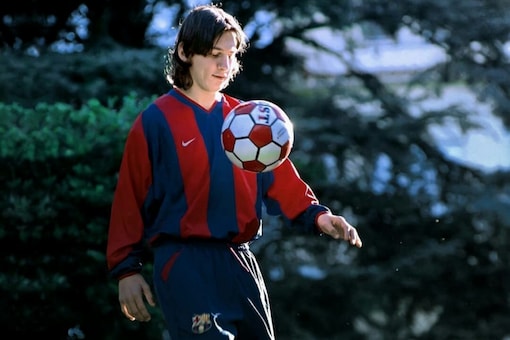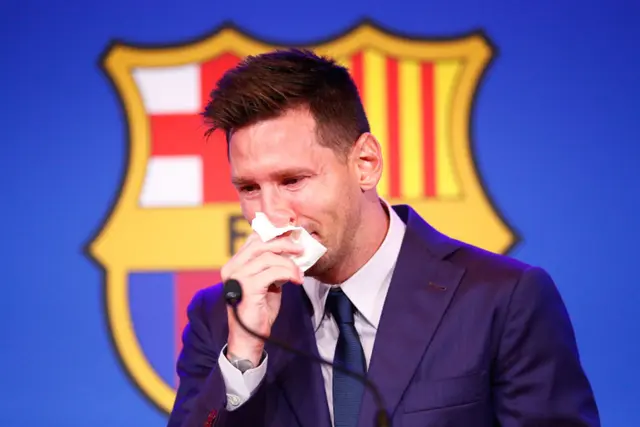The story that started with a paper napkin on a Thursday of December, 2000 has finally come to an end. Lionel Andrés Messi, one of the biggest sports icon of this generation (arguably all time) has finally left the city which he has called his home for more than 2 whole decades. The myth was all set for a fairy tale ending until all hell broke lose on the fifth of August with a mere 10 word tweet from the official FC Barcelona twitter handle.
Born in 1987 in Rosario, Argentina, Lionel was recognised as a generational talent since he was a young boy. One who was born just to dominate and reach the zenith “The Beautiful Game”. An unusually diminutive boy, the Argentine was 10 years old when he was diagnosed with growth hormone deficiency but his talent shined regardless. The health insurance covered only two years of the treatment for this condition, which cost at least $1,000 per month. The youth club Leo was enrolled in (Newell's Old Boys) agreed to contribute, but later went back on their promise, a decision which changed Leo’s life in all ways possible.
It was at this time when a trial was arranged with the club in Catalonia FC Barcelona. The officials at the club were so impressed with the Argentine that after some hesitance they not only agreed to pay for his treatment but also got him admitted to La Masia (Barcelona’s world famous Football Youth Academy which has given us players like Iniesta, Xavi, Pique, Guardiola etc.). In order to show their commitment to Leo a contract was signed on a paper napkin due to the unavailability of paper at that time (One which is still preserved as a relic) in a restaurant.

So, a 13 year old Lionel Messi relocated to Barcelona with his family. A move which wasn’t easy for a child well-adjusted in his life in Rosario and had to change his entire lifestyle (including his language) for this move. At home, he would suffer from homesickness after his mother moved back to Rosario with his siblings, while he stayed in Barcelona with his father. At the same time, during his first year at the club, there were problems registering Leo as he wasn’t a Spanish national. Also, Newell’s Boys (his previous club) was unwilling to make the necessary transfer arrangements with which Barcelona could enrol him in the Spanish Football Federation. This prevented from playing with other kids of his age in competitive games. He was only limited to playing friendly games and games with Children’s B team (Not the A team).
Leo’s experience in Barcelona had definitely started on the wrong foot. Suffering multiple injuries, going through injury rehabs and in the end only playing two official games and one friendly. Several of these difficulties added up and things really couldn’t get any worse so much so that his family considered giving up on the dream and returning to their home town of Rosario.
But, Leo was determined, he made it very clear that he wanted to fulfil his dream of succeeding in Barcelona and that there was no reason to worry about him. This was an early indicator of the determination and perseverance of the Argentine, one which he has shown all throughout his career while taking on challenges and completing them no matter what it takes.
After an entire year of adjustments and waiting for his turn it was on 17 February 2002 that Leo was finally allowed to play a competitive Championship game. It was after this when the bad days seemed to be over and the triumphs started soon thereafter. In the next few months, Leo won his first title for Barcelona followed by several more victories all over Europe. These victories also brought individual success for Lionel, winning several “Best Player of the Tournament” awards and being recognised as a talent with the potential to become one of the best players of all time. These successes also brought attention from clubs (in the form of offers) outside of Spain who saw him as an unusual talent of immense upside but he decided to stay in Barcelona. This decision almost became an yearly occurrence amid interest all over Europe throughout his career to secure Leo’s services.
It was in 2003 that his meteoric rise through the different levels in Barcelona’s hierarchy started. He debuted for 5 different levels of teams in a single year (which was a record). Even in training he raised eyebrows of players as well as coaches who couldn’t believe what they were watching. At just the age of 16, Leo made his debut for the first team in a friendly (one of the youngest ever to do so). He was so impressive that Ronaldinho told his teammates that he believed the 16-year-old would become an even better player than himself after just watching him in his first senior training session. It was almost poetic when he scored his first senior goal on 1 May 2005, from an assist by Ronaldinho, becoming – at that time – the youngest-ever scorer for FC Barcelona.
Having already had his breakthrough in the team in years 2005 and 2006, Messi established himself as one of the best players in the world during the consequent season. He was being called “A footballing virtuoso”, “Barca’s treasure” “A genius” among many other praises. The Argentine was already drawing deserving comparisons with Brazilian Pele and compatriot Diego Maradona. People started to look at him as the apparent “Heir of Maradona”. Since the days of Diego’s retirement, Argentinians had hoped and dreamt of another magical and mercurial player one they could love, worship and admire the way they did Diego. Amid the frequently drawn comparisons between the two players, Messi coincidentally (or not) scored and nearly replicated Maradona’s two most famous goals while playing for Barcelona in just a span of 7 weeks.
At just 20 years old, Leo became Barcelona’s star player taking over Ronaldinho while receiving the nickname “Messiah” from the Spanish Media. A role he fulfilled for the next 14 years of his career while he was at the club.
After establishing himself as the best player on the team as well as the world, Leo’s career at Barcelona got him a lot of success with some failures along the way. He won team as well as personal accolades almost each year breaking all the records he possibly could. His story isn’t just about the goals or the trophies or the several records he broke, it's about the way he went on to do it. He put up a spectacle each time he played bringing joy and happiness to people not only in the city of Barcelona but all over the world. He made people living in Asia, Australia, Africa and the Americas connect to and root for a city they had no previous connection with. From giving up on your sleep to waking up in the middle of night just to watch these games, Leo managed to connect as well as make a global sport even more global than it already was.
When compared to his peers, Lionel Messi wasn’t the most gifted athlete playing football but he has still managed to dominate and stay at the top of the sport in a way very few athletes have managed to in their respective sports. It wasn't just the dominance, it was how he he achieved that. Each game he played brought the viewers excitement as well as something to look forward to. It was like going to a magic show where each time a new act was being presented and you didn't know what to expect. The only thing you knew was that at the end of the 90 minutes you would feel content and almost blessed to witness such artistry.
He became the symbol and embodiment of a football club which has had a rich history of close to 122 years. Leo brought about the most successful era of a club which has always been in the shadow of its rival club in Madrid. This not only elevated him to the forefront of all the legends to have played for the club but also made him synonymous with the club and the city. Messi became Barcelona and Barcelona became Messi. Even when the team went through gradual declines and disappointments, Leo was the sole beacon of hope and expectation. So much so that this gave credence to the notion of Messidependencia, Barcelona's perceived tactical and psychological dependence on their talisman.
Lionel Messi throughout his career at Barcelona was must-see TV. He not only brought fans from all over the world to watch him at Camp Nou in Barcelona but also became the reason for record levels of revenue for the institution. It was estimated that Leo himself single-handedly makes the club 30 percent of their total revenue. Messi brings this money to the club thanks to winning trophies (and thus, bringing prize money to Barca), signing sponsorship contracts, ticketing, shirt sales (8 of 10 sold jerseys carry Messi's name on the back), etc. Potentially, Barca could even lose up to 50% of some of their sponsorship money due to 'the Messi clause' that gives a sponsor a discount if the Argentine is no longer a Barca player, indicating the true value of the partnership with the Messi-less Barcelona.
However in the end, the farewell didn't seem like it matched the whole story. Years and years of mismanagement by the Barcelona management had finally caught up to them and in turn cost them their hero. Carelessly spending their money on unnecessary signings, getting involved in shady deals to avoid paying taxes and having no specific sporting as well as economic project on their hands, the democratically elected board of Barcelona which came into power when they were at the peak of Europe finally left after a Vote of No Confidence. The long, long thread of the continuous irresponsible, detrimental behaviour absolutely crushed the team from both a sporting perspective and financial perspective. It took Barcelona suffering 3 of the their worst humiliating defeats in recent history in consecutive years and Messi threatening to leave for that board to finally resign in 2020. They left the club in absolute turmoil. The club was in massive debts and the pandemic even led to reduced revenues.
Following the resignation of the board and the disgraced president, FC Barcelona saw some resurgence in spirit and hope when their greatest ever President (Joan Laporta) got re-elected to the position of president. Laporta was the president when Messi broke into Barca's first team. He was the president when Pep Guardiola was appointed as manager, too, and oversaw a period of dominance including Barca's first treble in 2009. The charismatic lawyer had a good relationship with the player and his father, Jorge. Shortly after Laporta was elected in March for a second term, he had lunch with Messi, who has since explained that he left that meeting convinced he would prolong his relationship with Barcelona. However, with each passing week, the true extent of Barca's financial problems came into focus. The club's gross debt was creeping towards €1.2 billion, and LaLiga president Javier Tebas warned that, without huge cutbacks, they would not be permitted to register a new deal for Messi. Afterwards, Laporta explained he would have been putting the club's future in jeopardy by signing off on the CVC deal (a deal offered by La Liga where they would have received a cash injection giving up revenue over long term), even if it meant keeping Messi.
In the end, it was financially impossible for Barcelona to renew their club's greatest ever player and so he had to leave even when he had wanted and decided to stay. Almost poetically, the story that started off with a contract being signed on a paper napkin ended with Messi in tears holding a paper napkin consoling himself, for he was leaving his home. Lionel Messi Messi Messi Messi



















































